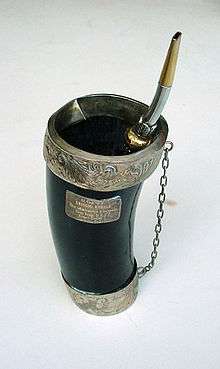Tereré

Tereré or Tererê (of Guaraní origin[1]) is an infusion of yerba mate (botanical name Ilex paraguariensis), similar to mate but prepared with cold water and ice rather than with hot,[2] and in a slightly larger vessel. It is originally from Paraguay,[3] and is found also in northeastern Argentina and southern and western Brazil. The Guaraní people call this infusion ka'ay,[4] where ka'a means herb and y means water.
First invented by the Guaraní natives who lived in Paraguay and western Brazil (Mato Grosso do Sul) territory that used to belong to Paraguay before the war of the Triple Alliance, Tereré was spread by the dwellers of that region, and for centuries was a social beverage. People usually prepare one jar of natural water and a "guampa" (Spanish) / "cuia" (Portuguese) with a "bombilla" (Spanish) / "bomba" (Portuguese) which is shared among the group of people. Paraguay and Mato Grosso do Sul have a very hot climate, this drink is believed to refresh the body and can be a very low-calorie, non-alcoholic beverage. Additionally, it is an important ritual signifying trust and communion.
A lot of people drink tereré with cold water, ice and herbs, that can be medicinals or refreshing, but other people just drink with cold water and ice. It is common in northeastern Argentina and southern and western of Brazil prepard with citrus fruit juices like lime, orange and pineapple, although this practice varies depending on the region. Mixing fruit juices with tereré is commonly called "tereré ruso" (Russian tereré) because this practice is more common with Slavic immigrants in the northeast of Argentina.
Guampas/Cuias are like a glass that can be made from animal horns, usually made from cattle horns, but some people made guampas from metal, wood and silver. The new guampa/cuia or the one not used for some time needs to be watered before use, because the lower part of the cuia is usually capped with a round piece of wood. By filling the guampa/cuia with water the wood expands, covering all leaks in the guampa/cuia. Guam's and Cuias are also made from wood and covered in leather or steel.
Bombilla is a metal straw with a filter at the end. The yerba mate is placed at the bottom of the guampa, and as water is added the bombilla drinks from the guampa the clear green liquid.
Tereré in Paraguay
Tereré is a typical, popular drink from Paraguay where it is common to see students, friends, co-workers or families drinking tereré together during the summer, a time when temperatures reach 40 to 45 °C (104 to 113 °F). Some people put medicinal herbs or "yuyos" into the water to treat ailments such as headaches, stomach aches and high blood pressure.
Production of customized vacuum flasks "termos" for the water and guampas is common. These termos usually consist on a leather-covered 2-Liter thermos commonly filled with iced water and "yuyos" (medicinal herbs). The thermos has a leather cup-shaped space on the side for the leather-covered guampa. The guampas and leather-covered vacuum flasks are often personalized with names or logos. Its common to see people on the streets carrying these thermos by a leather strap for convenience.
Tereré Preparation
Most preparations of tereré begin by filling a cured yerba mate gourd, guampa1/3 to 1/2 full of yerba mate. Then, ice cubes and/or herbs are added to the water on to the vacuum flask. The drinking vessel is then filled with ice water. At this point, a mate straw (yerba mate bombilla) is inserted through the mixture to the bottom of the vessel, while a thumb is kept over the bombilla tip in order to keep it from becoming clogged.[5] The liquid is consumed through the straw, and refilled as desired.
Some of the more popular juices and fruits to use in tereré are lime, orange, lemon, mango, peach, or grapefruit. Some of the more popular herbs to use in tereré are mint, lemongrass, or lemon verbena. Of course, any herb or juice could be added, even beer and lime cola have their supporters.[5]
See also
| Wikimedia Commons has media related to Tereré. |
References
- ↑ "Tereré in RAE dictionary"
- ↑ (Spanish) ¿QUE ES EL TERERE? (Paraguay)
- ↑ (Spanish) Tomate un tereré
- ↑ "Interactive Dictionary Guaraní-Español"
- 1 2 "Terere". http://www.ma-tea.com. Retrieved 2013-05-30. External link in
|publisher=(help)